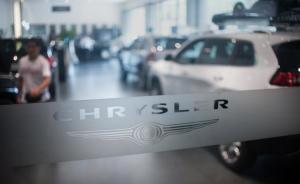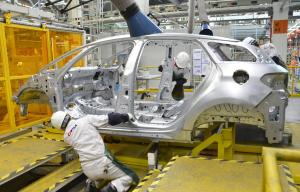|
China stepped up pressure on foreign carmakers in the world’s biggest auto market Wednesday, pledging to punish German luxury brand Audi and Chrysler of the United States for "monopoly behaviour".
The National Development and Reform Commission (NDRC), which polices violations of China’s "anti-monopoly" law, has been investigating the sector -- dominated by foreign companies and their joint ventures -- for more than two years but had not mentioned any particular firms.
It is the latest sweeping probe China has launched into alleged wrongdoings by foreign firms in multiple different sectors, among them pharmaceuticals, technology and baby milk.
Moves to lower prices can garner public support, while Beijing has also shown a tendency to favour building up national champions, especially in industries dominated by foreign companies.
Audi is the luxury car unit of Volkswagen, Europe’s biggest auto group, while Chrysler has merged with Italy’s Fiat.
"It has been found out that the two companies showed monopoly behaviour and they will be punished accordingly in the near future," NDRC spokesman Li Pumin told a news conference in Beijing.
View gallery

A Chrysler logo is pictured at a car dealership in Shanghai on August 6, 2014 (AFP Photo/Johannes Ei …
Audi’s German headquarters said the company was co-operating with the NDRC inquiry but would not comment further. A spokesman for Fiat-Chrysler in China declined to comment.
The NDRC announcement came two days after anti-monopoly investigators from the agency raided a Shanghai office of Mercedes-Benz, a luxury unit of Germany’s Daimler, by grilling employees and inspecting computers.
Li confirmed the investigation into Mercedes-Benz, according to a transcript of the news conference posted online. Daimler said on Tuesday that it was "assisting" the inquiry.
China is critically important for foreign auto makers, especially as the European market has faltered, with total sales of 21.98 million vehicles last year.
Regulators believe prices for both parts and vehicles are unfairly high in the country, but manufacturers say authorities impose heavy duties on imported cars and parts, which ramp up costs for domestic consumers.
View gallery

Workers put together a car at a PSA Peugeot Citroen factory in Shenzhen, in south China’s Guangd …
China considers using a dominant market position to set prices as a form of monopoly. Violators’ "illegal gains" can be confiscated, and they can be fined up to 10 percent of their sales revenue in the previous year.
- Price cuts -
Another 12 Japanese companies were under investigation for monopoly pricing of auto components and bearings, Li said, but declined to name them, adding details would be released later.
Car companies have rushed to cut prices in recent weeks in an apparent bid to appease Chinese officials.
On Sunday, Daimler announced it would slash prices of more than 10,000 spare parts for its Mercedes-Benz cars in China from September 1, according to a statement that linked the move to investigations of the entire auto industry in China.
View gallery

The Mercedes-Benz’s Shanghai office is shown on August 5, 2014 (AFP Photo/Johannes Eisele)
Audi lowered its spare part prices last week, according to a statement, while Chrysler said Tuesday it would slash prices for both parts and some of its Jeep models, Dow Jones Newswires reported.
The NDRC spokesman said the anti-monopoly investigations started at the end of 2011, but analysts say China has recently escalated the issue.
"Dealers and consumers have already complained for years," said Yale Zhang, managing director of research firm Automotive Foresight, adding that auto firms’ "strong actions, which have existed for years, actually are a monopoly".
He said authorities were examining industry-wide practices such as setting minimum retail prices for dealers and limiting who can sell spare parts, which keeps prices higher.
- Microsoft raided -
View gallery

A cleaner walks past a Microsoft office building in Beijing on July 31, 2014 (AFP Photo/Greg Baker)
Wednesday’s announcement came as the State Administration for Industry and Commerce (SAIC), which also enforces the anti-monopoly law, investigates US software giant Microsoft for allegedly operating a monopoly.
The government agency last week raided four of the company’s offices around the country and said Wednesday it had visited a Microsoft premises, as well as an office in the northeastern city of Dalian of management consultancy Accenture, which handles some financial services for the tech firm.
The SAIC has said the inquiry centres on Microsoft’s Windows operating system -- which is used on the vast majority of computers in China -- and the Office suite of programs.
In another chill for US tech firms, state media have said China is planning to announce US chip maker Qualcomm has monopoly status in the mobile phone chip market.
Chinese authorities investigated British drugmaker GlaxoSmithKline following allegations it systematically offered bribes to doctors and hospitals and passed the cost on to consumers through high prices.
Following a 10-month probe, police said in May that GSK’s former head of China operations and two other executives authorised the bribery.
Last year, China fined six baby formula producers -- all but one of them foreign -- a total of $108 million for price-fixing. |



